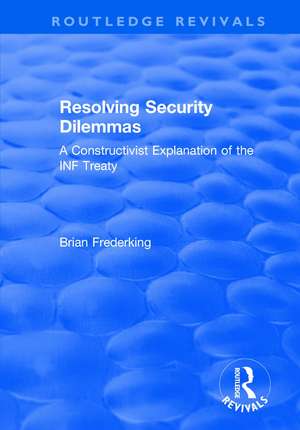Resolving Security Dilemmas: A Constructivist Explanation of the INF Treaty: Critical Security Series
Autor Brian Frederkingen Limba Engleză Paperback – 11 noi 2019
| Toate formatele și edițiile | Preț | Express |
|---|---|---|
| Paperback (1) | 146.21 lei 6-8 săpt. | |
| Taylor & Francis – 11 noi 2019 | 146.21 lei 6-8 săpt. | |
| Hardback (1) | 550.57 lei 6-8 săpt. | |
| Taylor & Francis – 15 iun 2018 | 550.57 lei 6-8 săpt. |
Preț: 146.21 lei
Preț vechi: 176.86 lei
-17% Nou
Puncte Express: 219
Preț estimativ în valută:
27.98€ • 29.03$ • 23.39£
27.98€ • 29.03$ • 23.39£
Carte tipărită la comandă
Livrare economică 15-29 martie
Preluare comenzi: 021 569.72.76
Specificații
ISBN-13: 9780415791823
ISBN-10: 0415791820
Pagini: 184
Dimensiuni: 152 x 229 mm
Greutate: 0.34 kg
Ediția:1
Editura: Taylor & Francis
Colecția Routledge
Seria Critical Security Series
Locul publicării:Oxford, United Kingdom
ISBN-10: 0415791820
Pagini: 184
Dimensiuni: 152 x 229 mm
Greutate: 0.34 kg
Ediția:1
Editura: Taylor & Francis
Colecția Routledge
Seria Critical Security Series
Locul publicării:Oxford, United Kingdom
Cuprins
Contents: The buildup argument; Constructivism; The rules of the Cold War; Deadlock: the 1981-1983 INF negotiations; Challenging Cold War rules; Agreement: the 1985-1987 INF negotiations; The new thinking argument; Bibliography; Index.
Recenzii
’...blows away the fog that has enveloped constructivism...’ Nicholas Onuf, Florida International University, USA ’Resolving Security Dilemmas offers a novel thesis about the INF Treaty and makes a valuable contribution to the burgeoning literature on the end of the Cold War.’ Journal of Cold War Studies
Descriere
This title was first published in 2000. By applying constructivist arguments about culture, norms and identity this book explains the superpower negotiations that produced the INF Treaty. It contributes to the constructivist research program in two ways. First, it develops a speech act model of social interaction to illustrate constructivist arguments and second, it develops a constructivist theory of security dilemmas that suggests practical ways to resolve them. The conclusion is that the dominant understanding of the end of the Cold War (the build-up argument) is not correct, it advocates policies that tend to perpetuate conflicts. Instead it is argued that the new thinking explanation is more coherent and suggests improved practical ways to resolve other security dilemmas.


